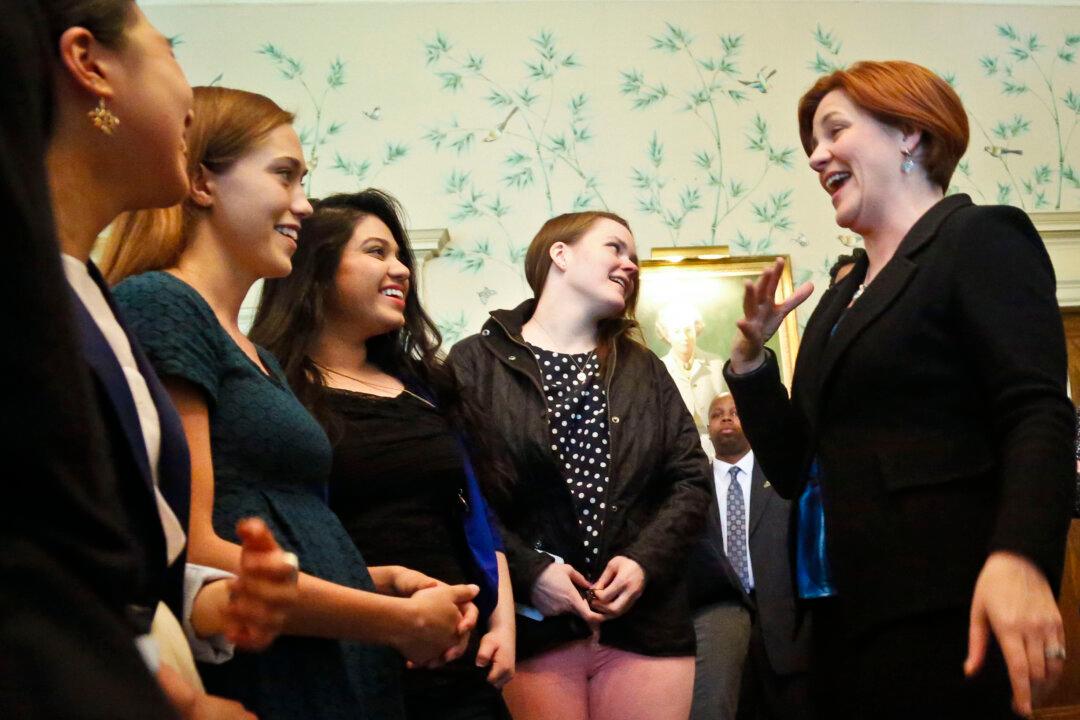NEW YORK—Speaker Christine Quinn’s booming voice usually fills a press conference as she rattles through her agenda, and takes questions from the media with authority. But on Tuesday Quinn revealed a more personal side during a Q&A with Barnard College President Debora Spar, students, and members of the press.
Quinn’s signature laugh was peppered throughout the semi-casual conversation, but at times her voice became unusually subdued, and she choked up more than once as she walked the people in the room through some of the darkest times in her life.
“This kind of conversation is not my forte,” said Quinn, who joked she would rather discuss the intricacies of legislation or city building code.
Quinn, a front-running Democratic mayoral candidate, discussed how the death of her mother when she was 16 led her to bulimia and alcoholism. Speaker Quinn has spoken of the death of her mother in previous interviews, however, this marked the first time she revealed the effects the traumatic experience had on her life.
Quinn said her mother’s hearing faded the final summer she was alive, and Quinn was the only one whose lips she could read. This led Quinn to deliver her mom’s medical updates from the doctor, which were always bad.
“It was the best, and worst summer of my life,” Quinn said.
Perfection
Quinn spoke candidly about her strive for perfection, a trait she said was born from a feeling that if she was perfect, her ailing mother would get better. She said perfect for her was to be thinner, prettier, better grades, and being more involved.
Quinn, who battled with her weight, overheard some girls talking about throwing up to lose weight and she thought it was a great idea.
On Tuesday, she was able to look back and laugh, calling herself a “failed bulimic” because she never lost any weight.
With the bulimia behind her, she looked out at the roomful of college students, and doled out advice she can see now, but was blind to back in high school. “The drive to be perfect, particularly as women, is what keeps us from being great,” Quinn said.
And she has come to terms with being less than perfect these days. Quinn shared an example from a recent press conference where her staff had prepared answers for off-topic questions. She failed to review them, and when a reporter asked a question, Quinn began to fumble. A staff member mouthed to look at the card, but instead of trying to be perfect and play off like she knew, she made a joke of it in front of the press about how she did not read the cards.
“I admitted that I did not do my homework and was not perfect in that moment,” Quinn said. “For me, it made the press conference a million times more fun.”
Recovery
In addition to bulimia, Speaker Quinn said she also developed a drinking habit to help cope with the loss of her mother. Quinn said she went to rehab at age 26 for her bulimia and learned to tone down her drinking there.
Quinn says she drank a glass of wine a month for 15 years or so before quitting altogether approximately three years ago. She said there was no incident or moment to make her quit, rather it happened naturally.
“I progressively, in the thinking of my life, wanted to be healthier,” Quinn said. “I started exercising, started to eat better—and at that point, a little over three years ago, I just thought it would be better to not have alcohol in my life at all.”
Quinn joked about it not being much of a story, however, she still considers herself an alcoholic to this day. When asked by another reporter if she went to Alcoholics Anonymous, Quinn said, “The second ‘A’ in Alcoholics Anonymous is anonymous. So I am going to honor the tradition of that program and I am not going to answer one way or another about membership in that program.”
Election Timing
Speaker Quinn decided to come clean in the middle of a highly competitive election in which she is the front-runner—but not by much.
Quinn said the timing had nothing to do with election politics, as suggested by The New York Times. Quinn said she was shedding light on the truth about her past to help others, something she said she was not ready to do until now.
“I wish I would have been ready sooner, but you are ready when you are ready,” Quinn said. “No matter who you are, these are not easy things to talk about.”
By disclosing her struggle with bulimia, a disorder that’s considerably more common in women than in men, Quinn could foster empathy among women voters, while at the same time reshaping a political narrative that has sometimes portrayed her as aggressive, said Barbara Koziak, a political science professor who also teaches in the women’s studies program at St. John’s University in New York.
The portrayals of Quinn have also stirred questions about whether that narrative would be a non-story if she were a man in a city not exactly known for its reserve.
“I think she’s really trying to manage some of this treacherous terrain now by presenting more of her personal life,” Koziak said.
Quinn’s approach impressed Tabia Santos, a Barnard senior who heard Quinn’s talk.
“I think that we, as a society, are moving toward being open ... so it’s better for people to be open and upfront about things,” said Santos, a 21-year-old neurology major who hasn’t yet settled on a candidate in the mayor’s race.
The Associated Press contributed to this report.





